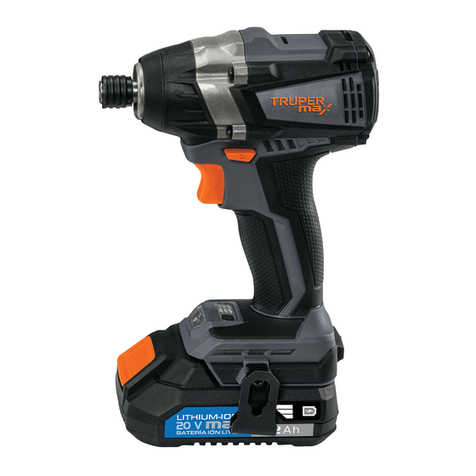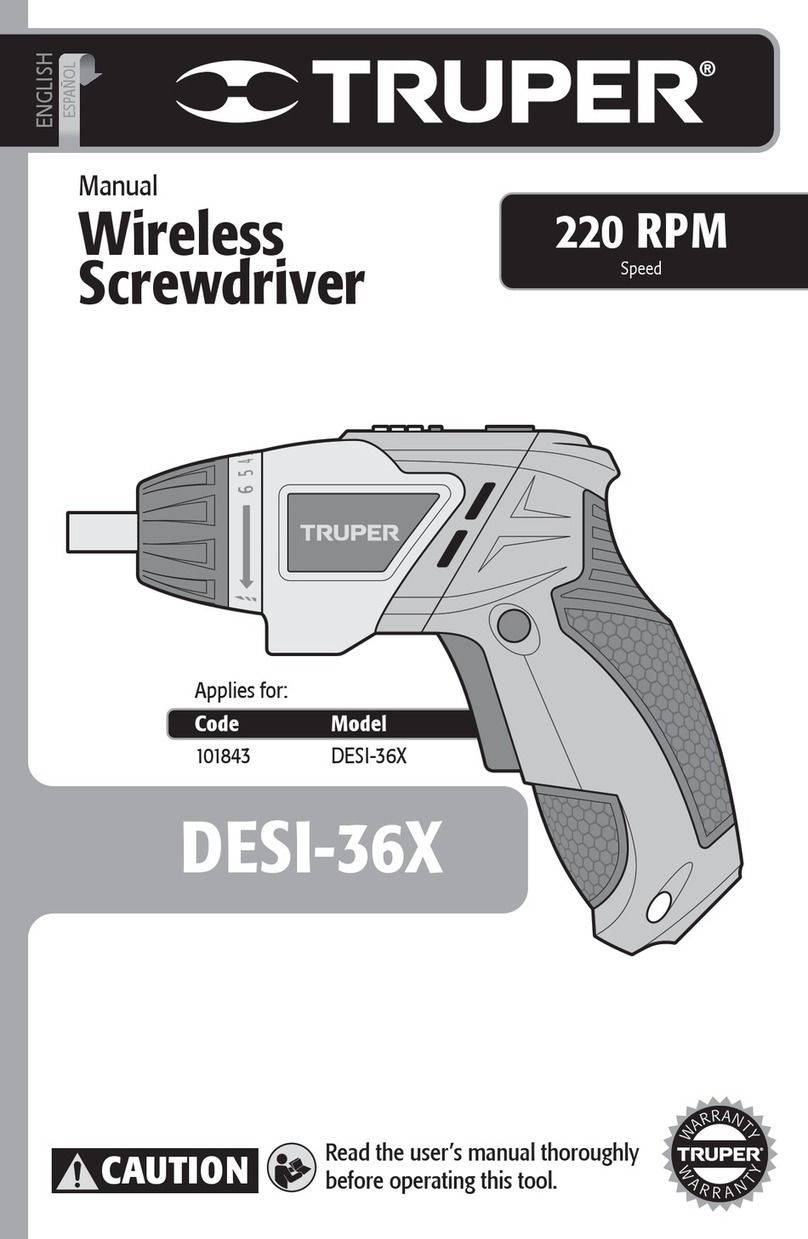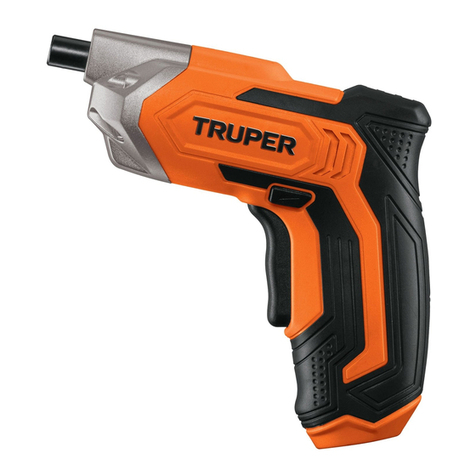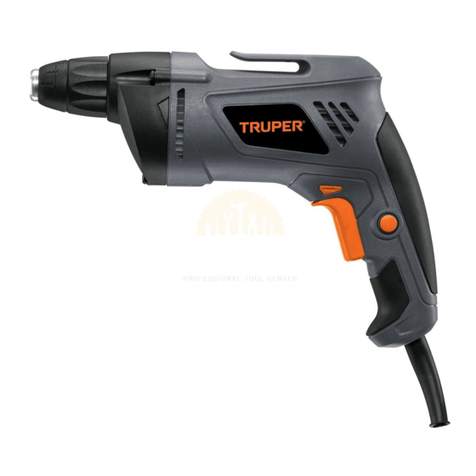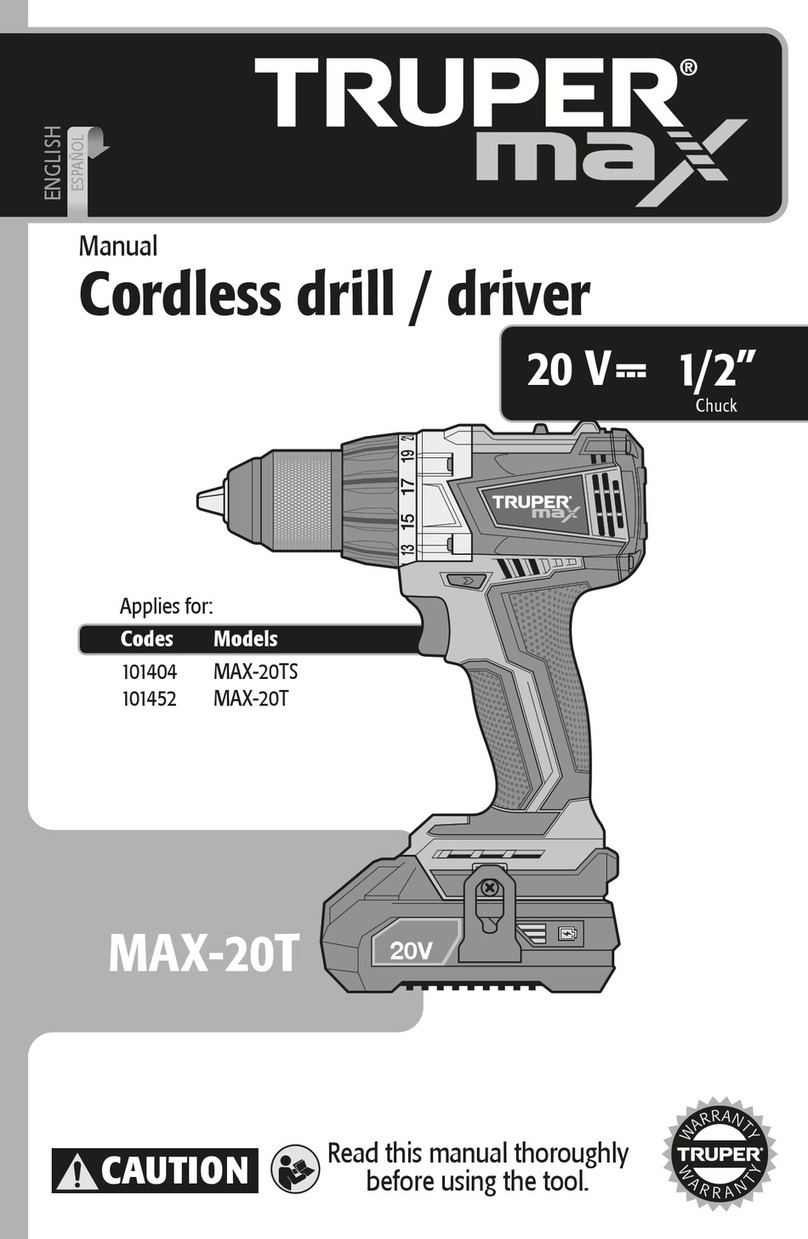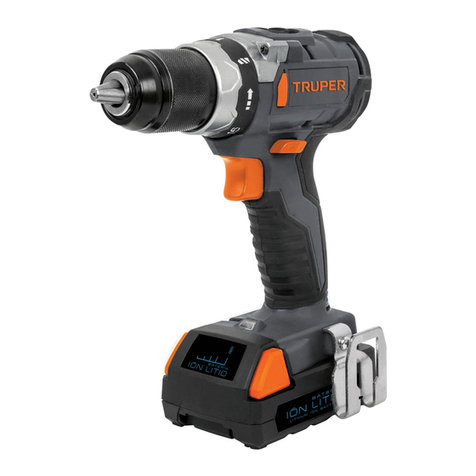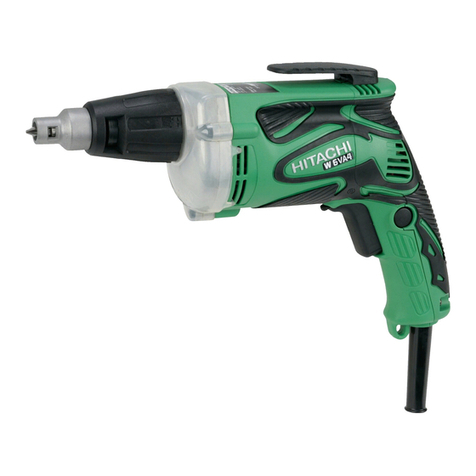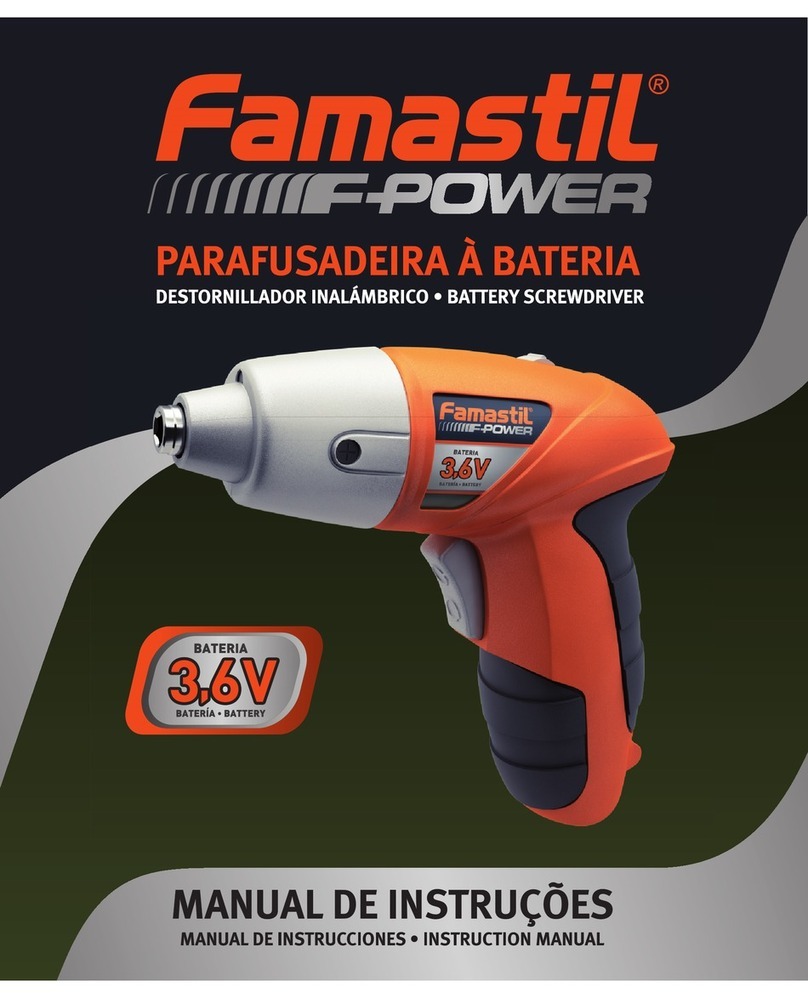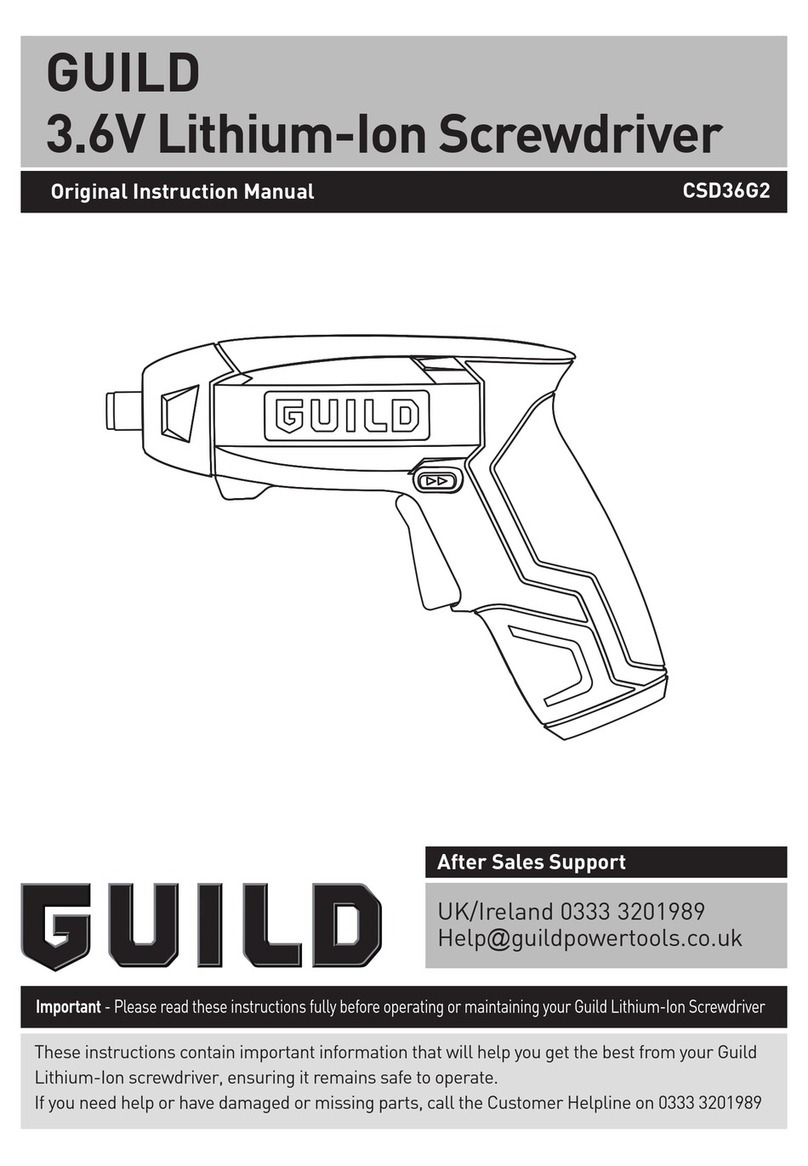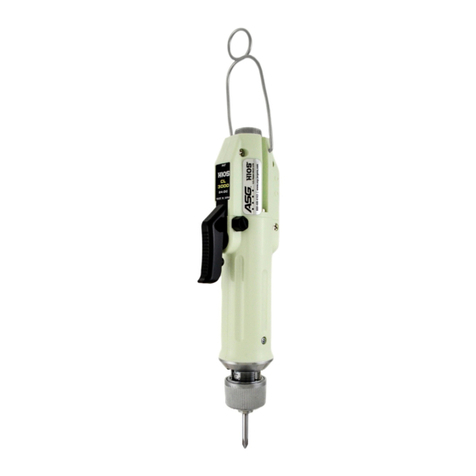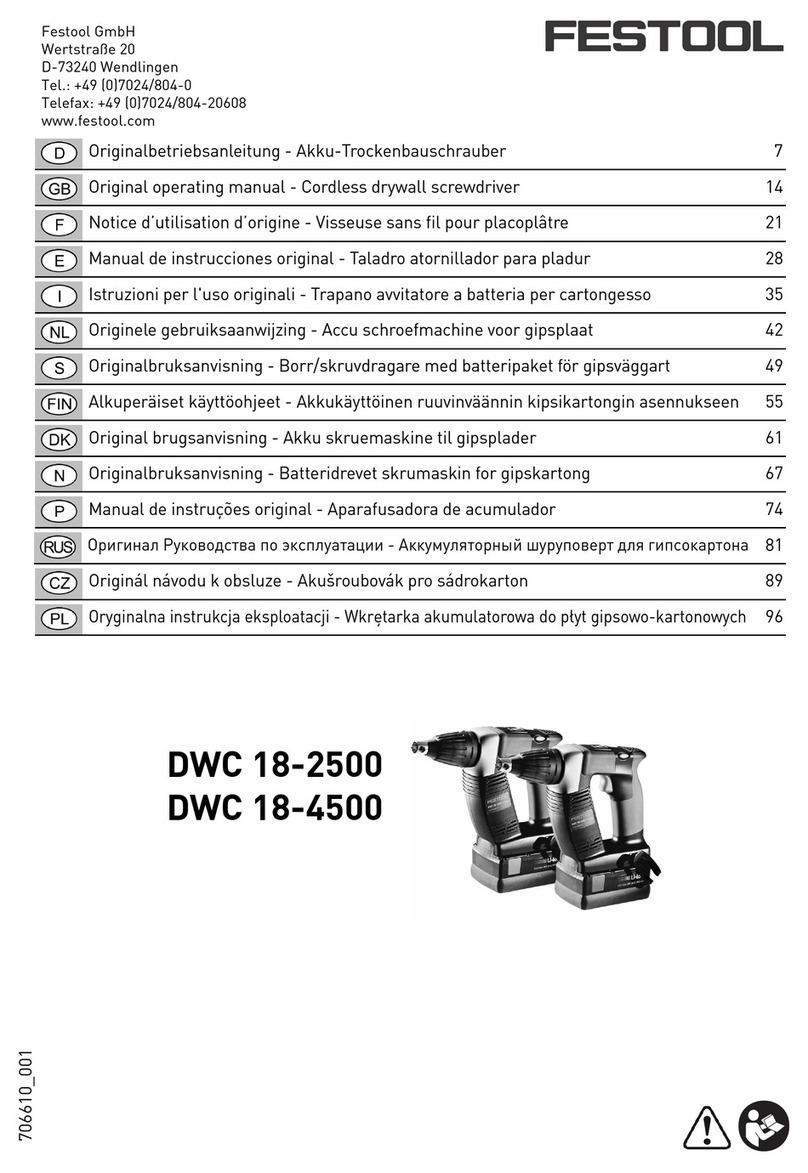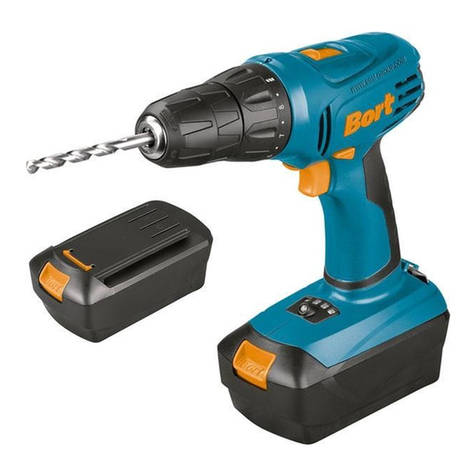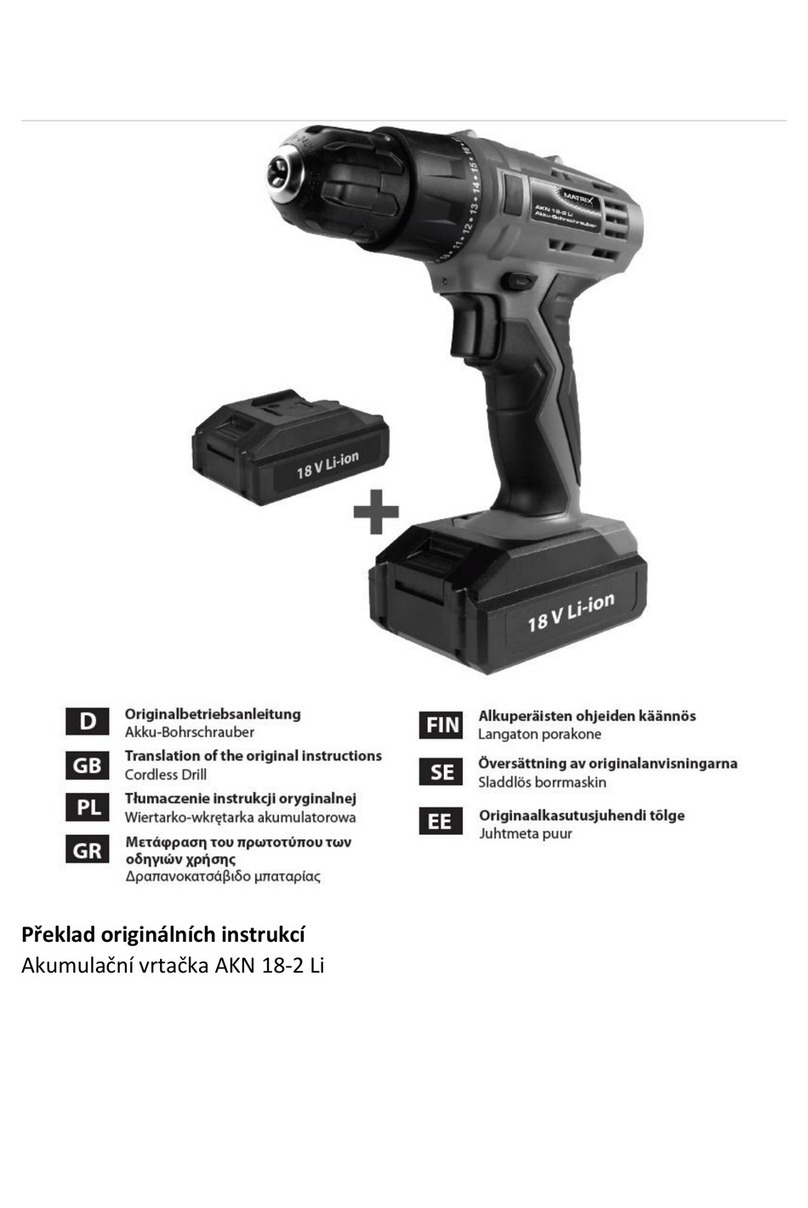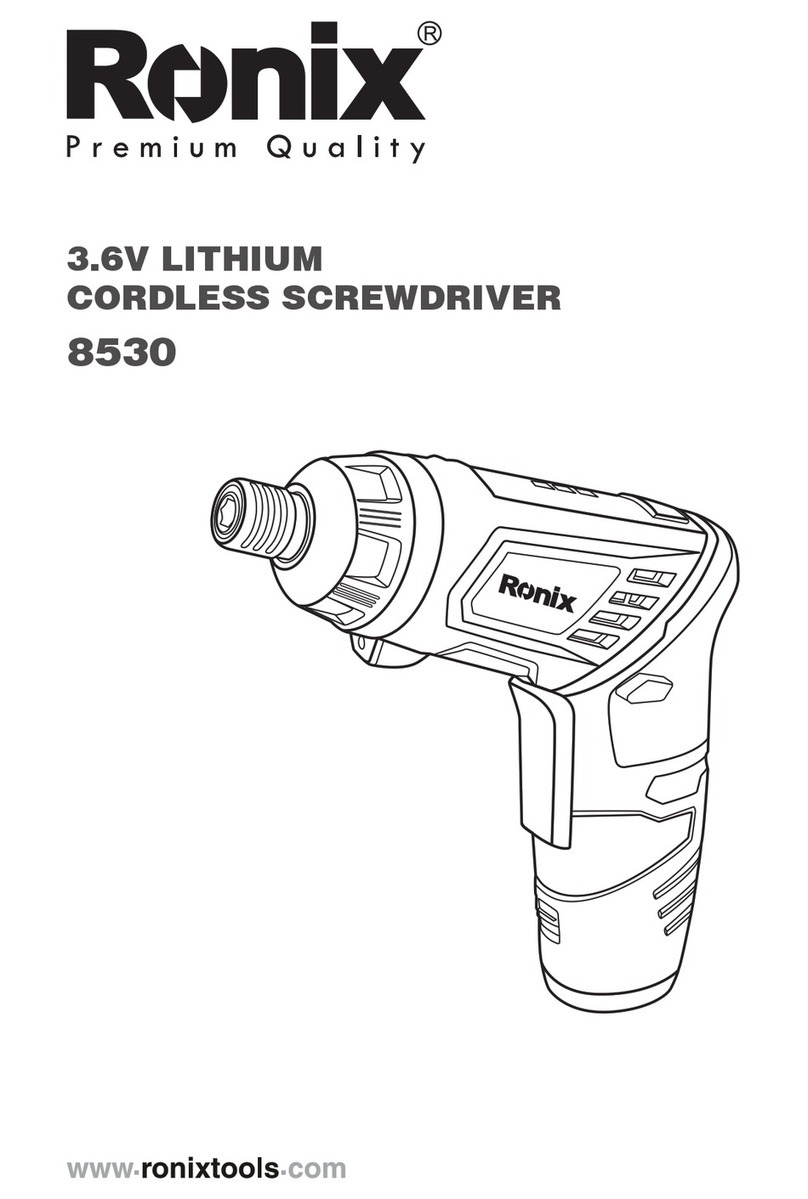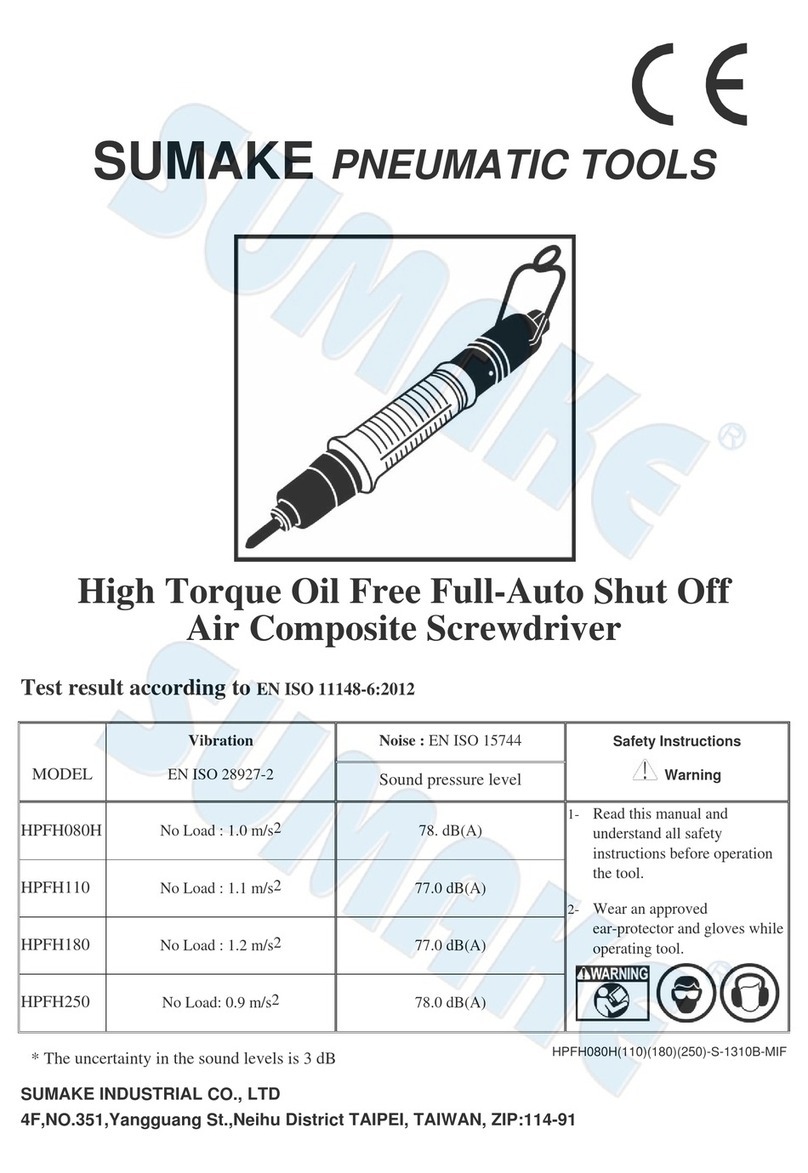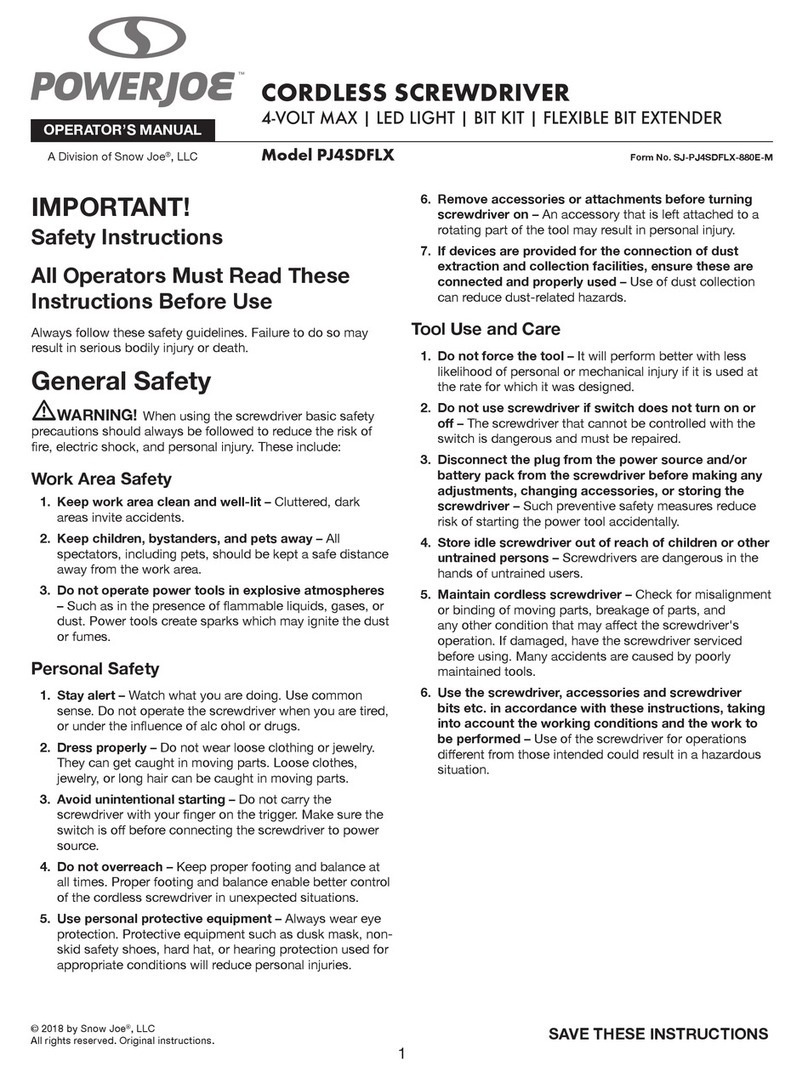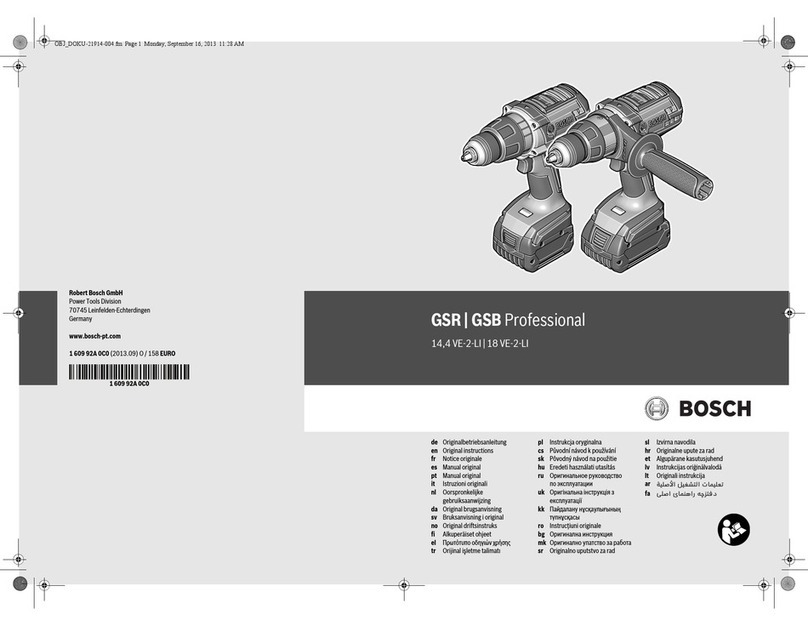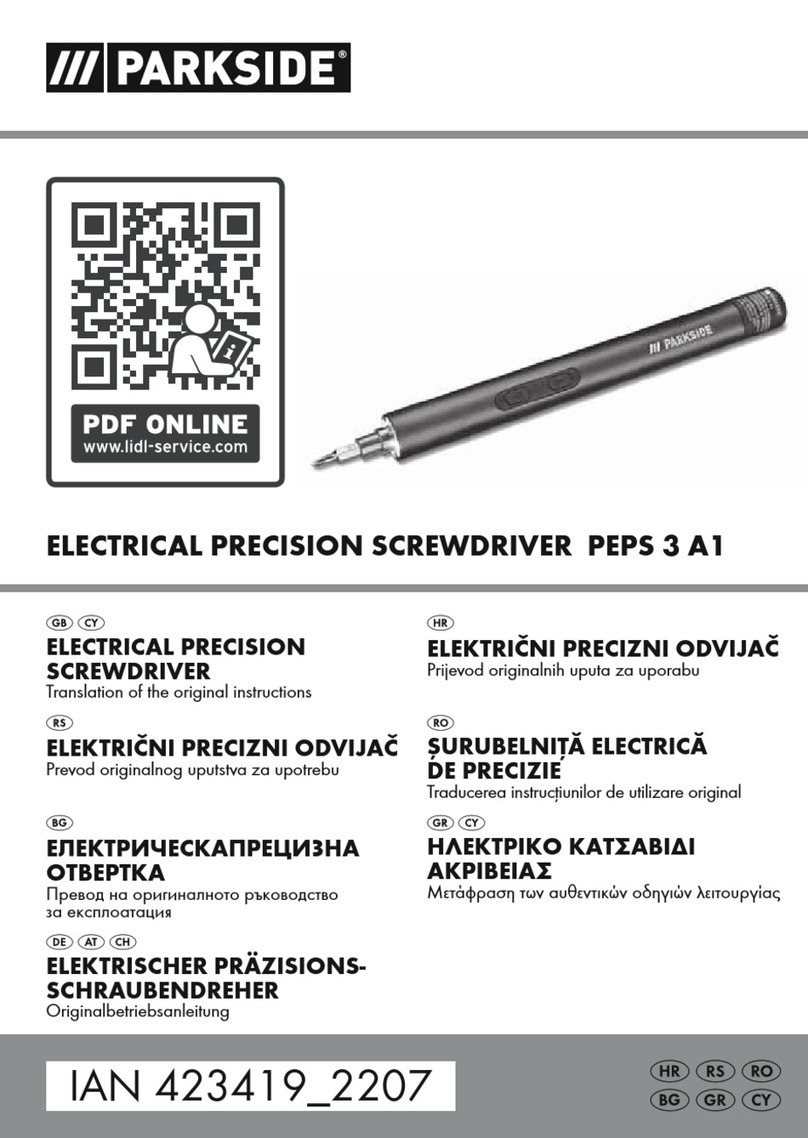Truper DIMI-20A User manual

Manual
Cordless impact
screwdriver
DIMI-20A
ModelCode
DIMI-20A
Applies for:
101606
Tip holder
20 V 1/4”
CAUTION Read this manual thoroughly
before using the tool.
ENGLISH
ESPAÑOL

2
Technical data
Power requirements
Safety warnings for power tools
Safety warnings for cordless impact
screwdriver
Parts
Start up
Troubleshooting
Maintenance
Environmental protection
Notes
Authorized service centers
Warranty Policy
3
3
4
5
6
6
9
9
9
10
11
12
DIMI-20A
ENGLISH
Contents
CAUTION
Keep this manual for future references.
The illustrations in this manual are for reference
only. They might be different from the real tool.
To gain the best performance of
the tool, prolong the duty life,
make the Warranty valid if
necessary, and to avoid hazards
of fatal injuries please read and
understand this manual before
using the tool.

3
DIMI-20A
101606
IP 20
0 - 2 600 RPM
Cordless impact screwdriver
Forward – reverse
103 lb-ft (140 Nm)
Code
Description
Tip holder
Voltage
Speed
Rotation
Maximum torque
Battery
IP Grade
Input: Voltage: 127 V
Frequency: 60 Hz
Power: 40 W
Output: 12 V - 21 V 1.5 A
Charger
Power Cord Grips used in this product: Type “Y”.
Tool build class is: Class III
Charger build class is: Reinforced Insulation
20 V
Ion-lithium 20 V 2 Ah | Charging time: 90 minutes’ approximately
0 - 3 250 strokes per minute
Strokes per minute
1/4”
ENGLISH
Power Requirements
Technical Data
Tools with double insulation are equipped with a polarized plug
(one prong is wider than the other). This plug will only fit in the right way into a
polarized outlet. If the plug cannot be introduced into the outlet, reverse the plug. If
it still doesn’t fit, call a qualified electrician to install for you a polarized outlet. Do
not alter the plug in any way. Double insulation eliminates the need of both a
grounded third power cord with three prongs or a grounded power connection.
When using an extension cable, verify the gauge is enough for
the power that your product needs. A lower gauge cable will cause voltage drop in the line, resulting in power loss and
overheating. The following table shows the right size to use depending on cable’s length and the ampere capability shown in
the tool’s nameplate. When in doubt use the next higher gauge.
WARNING
WARNING
WARNING
from 0 A and up to 10 A
from 10 A and up to 13 A
from 13 A and up to 15 A
from 15 A and up to 20 A
18 AWG(*)
16 AWG
14 AWG
8 AWG
16 AWG
14 AWG
12 AWG
6 AWG
3 (one grounded)
from 6 ft to 49 ft | higher than 49 ft
Ampere
Capacity Number of
Conductors Extension gauge
*It is safe to use only if the extensions have a built-in artifact for over current protection.
AWG = American Wire Gauge. Reference: NMX-J-195-ANCE
When operating power tools outdoors, use a grounded
extension cable labeled “For Outdoors Use”. These extensions are especially designed
for operating outdoors and reduce the risk of electric shock.
WARNING
WARNING Avoid the risk of electric shock or severe injury. When the power cable gets damaged
it should only be replaced by the manufacturer or at a Authorized Service Center.
The build quality of the electric insulation is altered if spills or liquid gets into the tool while in use.
Do not expose to rain, liquids and/or dampness.
Before gaining access to the terminals all power sources should be disconnected.

4ENGLISH This tool is in compliance with the Official Mexican Standard (NOM - Norma Oficial Mexicana).
Work area
Keep your work area clean, and well lit.
Cluttered and dark areas may cause accidents.
Never use the tool in explosive atmospheres, such as in the
presence of flammable liquids, gases or dust.
Sparks generated by power tools may ignite the flammable material.
Keep children and bystanders at a safe distance while operating
the tool.
Distractions may cause loosing control.
Electrical Safety
The tool plug must match the power outlet. Never modify
the plug in any way. Do not use any adapter plugs with
grounded power tools.
Modified plugs and different power outlets increase the risk of electric shock.
Avoid body contact with grounded surfaces, such as pipes,
radiators, electric ranges and refrigerators.
The risk of electric shock increases if your body is grounded.
Do not expose the tool to rain or wet conditions.
Water entering into the tool increases the risk of electric shock.
Do not force the cord. Never use the cord to carry, lift or unplug
the tool. Keep the cord away from heat, oil, sharp edges or
moving parts.
Damaged or entangled cords increase the risk of electric shock.
When operating a tool outdoors, use an extension cord suitable
for outdoor use.
Using an adequate outdoor extension cord reduces the risk of electric shock.
If operating the tool in a damp location cannot be avoided, use
a ground fault circuit interrupter (GFCI) protected supply.
Using a GFCI reduces the risk of electric shock.
Personal safety
Stay alert, watch what you are doing and use common sense
when operating a tool. Do not use a power tool while you are
tired or under the influence of drugs, alcohol or medication.
A moment of distraction while operating the tool may result in personal injury.
Use personal protective equipment. Always wear eye
protection.
Protective equipment such as safety glasses, anti-dust mask, non-skid shoes,
hard hats and hearing protection used in the right conditions significantly
reduce personal injury.
Prevent unintentional starting up. Ensure the switch is in the
“OFF” position before connecting into the power source and /
or battery as well as when carrying the tool.
Transporting power tools with the finger on the switch or connecting power
tools with the switch in the “ON” position may cause accidents.
Remove any wrench or vice before turning the power tool on.
Wrenches or vices left attached to rotating parts of the tool may result in
personal injury.
Do not overreach. Keep proper footing and balance at all times.
This enables a better control on the tool during unexpected situations.
Dress properly. Do not wear loose clothing or jewelry. Keep
hair, clothes and gloves away from the moving parts.
Loose clothes or long hair may get caught in moving parts.
If you have dust extraction and recollection devices connected
onto the tool, inspect their connections and use them correctly.
Using these devices reduce dust-related risks.
Power Tools Use and Care
Do not force the tool. Use the adequate tool for your
application.
The correct tool delivers a better and safer job at the rate for which it was designed.
Do not use the tool if the switch is not working properly.
Any power tool that cannot be turned ON or OFF is dangerous and should be
repaired before operating.
Disconnect the tool from the power source and / or battery
before making any adjustments, changing accessories or
storing.
These measures reduce the risk of accidentally starting the tool.
Store tools out of the reach of children. Do not allow persons
that are not familiar with the tool or its instructions to
operate the tool.
Power tools are dangerous in the hands of untrained users.
Service the tool. Check the mobile parts are not misaligned or
stuck. There should not be broken parts or other conditions that
may affect its operation. Repair any damage before using
the tool.
Most accidents are caused due to poor maintenance to the tools.
Keep the cutting accessories sharp and clean.
Cutting accessories in good working conditions are less likely to bind and are
easier to control.
Use the tool, components and accessories in accordance with
these instructions and the projected way to use it for the type of
tool when in adequate working conditions.
Using the tool for applications different from those it was designed for, could
result in a hazardous situation.
Battery tool Use and Care
Recharge only with the charger specified by .
A charger that is suitable for one type of battery pack may create a risk of fire when
used with another battery pack.
Use power tools only with specifically designated battery packs.
Use of any other battery packs may create a risk of injury and fire.
When battery pack is not in use, keep it away from other metal
objects, like paper clips, coins, keys, nails, screws, or other
small metal objects, that can make a connection from one
terminal to another.
Shorting the battery terminals together may cause burns or a fire.
Under abusive conditions, liquid may be ejected from the
battery; avoid contact. If contact accidentally occurs, flush with
water. If liquid contacts eyes, additionally seek medical help.
Liquid ejected from the battery may cause irritation or burns.
Service
Repair the tool in a Authorized Service Center
using only identical spare parts.
This will ensure that the safety of the power tool is maintained.
Safety Warnings for
Power Tools
WARNING! Read carefully all safety warnings and instruction listed below. Failure to comply with any of
these warnings may result in electric shock, fire and / or severe damage. Save all warnings and instructions for
future references.

5
• Take your time to evaluate the work to be done and
make sure you have taken all the necessary precautions
before you start drilling.
• Adjust the accessory correctly.
• Use only batteries specifically designed
for the tool. Other batteries may create a risk of injury or
fire.
• Make sure the switch is in the OFF
position before inserting the battery or it will start to
operate unexpectedly, which could result in serious injury.
• Connect the charger only to an alternating current (AC)
supply.
• Do not use the charger outdoors.
• Observe “+/-” polarity when charging.
• Never recharge a leaking battery.
• Do not use batteries or the charger for purposes other
than those for which they were designed.
• Do not modify the contacts of the battery or the charger.
• Never expose the batteries to temperatures above 122 °F
• Never expose batteries to fire, they could
explode.
• The batteries must be kept away from
any metallic object such as paper clips, coins, keys, nails,
screws or any other object that could cause the terminals
to make contact; it could cause a short circuit that could
cause burns or fire.
• Under extreme conditions, battery fluid
may leak. If so, avoid any contact. If accidental contact
occurs, wash with abundant water, rinse with lemon juice
and vinegar. If the liquid enters in contact with the eyes,
wash with abundant water during several minutes and look
for medical help immediately. Liquid ejected from the
batteries could cause irradiation or burns.
• To maximize battery life, fully discharge
the battery at least once a month. Do not leave the battery
uncharged for more than three months. Always charge the
battery to its maximum capacity. Before using the machine
for the first time, charge the battery for a minimum of 1
hour and 30 minutes.
• Avoid stopping constantly while screwing to avoid
damage to the battery.
• This tool is designed to operate with
screws. IT IS NOT A DRILL.
• This is a light duty tool; it should not be used to remove
or install screws requiring high torque.
• Do not attempt to modify the tool or its accessories in
any way.
• Turn the screwdriver on after installing the bits.
• Use extreme caution when driving slotted head screws as
the tool may slip.
• Do not use excessive force.
• Do not use this tool with one hand.
• After each use, remove the tip and extensions and store
them properly.
Choking hazard! Children can swallow
small parts and suffocate. Keep children away from small
parts.
Hold the power tool by the insulated gripping
surfaces when performing an operation where the
fastener may contact hidden wires or its own power
cord.
• Fasteners that come in contact with an energized cord
can make the metal parts of the power tool live and, as a
result, cause an electric shock to the operator.
• Use ear protectors when performing services that make
noises above 85 dB. Exposure to noise can cause hearing
loss.
• Use a dust mask and dust extraction equipment if
necessary. Remember that working with materials such as
asbestos, lead paints, additives, some types of wood,
metals or minerals is highly toxic.
• Wear safety goggles.
When operating the screwdriver
• Use only screwdriver bits recommended
by .
• Keep the screwdriver bits in good condition. This reduces
the load on the tool and extends its service life.
• Turn off and unplug the tool before
reversing the direction of rotation of the chuck and before
installing or replacing a bit. Use auxiliary handles, if
provided with the tool. Losing control may cause personal
injury.
Choose the adequate accessory
Batteries and charger
ENGLISH
Safety Warnings for
cordless impact screwdrivers
WARNING
DANGER
DANGER
DANGER
DANGER
CAUTION
CAUTION
CAUTION
CAUTION
CAUTION
CAUTION

Parts
6
1
2
Start Up
1. Plug the charger plug into a 127 V~ outlet (The
green charging indicator light will turn on).
2. Insert the battery into the charger by sliding it
into the charger as shown in the picture. The green
light will turn off and the red light should turn on,
indicating that charging has started.
• When the battery is fully charged, the green light
will turn on and the red light will turn off.
• Disconnect the charger from the power supply
when charging is complete.
• If the red-light flashes, the battery is defective,
replace it with a new one.
• If the green light flashes, the battery temperature
is lower than 32 °F or higher than 113 °F. Wait until
the battery temperature is in the correct range
before charging.
Battery charge
Handle
Direction of rotation
and
locking button
Tip holder
collar LED
light
Battery connection prongs
Switch
Battery
release
button
Battery Belt clip
Tip holder Battery level
indicator
Cross tip
Battery
charger
Charge
indicator
ENGLISH

7
Start Up
The battery comes DISCHARGED from the factory. You will need to charge it for approximately 1 hour 30 minutes before you can
use it.
The normal charging temperature is 32 °F to 113 °F. Outside this range, charging is automatically suspended until the correct
temperature is reached. The normal discharge / working temperature is 32 °F to 167 °F. If 167 °F s exceeded, the electronic
control shuts off the power to the tool until the temperature reaches the optimum temperature range again. When the
battery is below normal voltage during work, the tool stops working. Between each charge, give the charger 15 minutes rest.
In a hot environment or after prolonged use, the battery may become too hot to be recharged. Allow the battery to cool
before attempting to recharge.
• To install the battery in the tool handle, align the battery unit with the
rails on the inside of the tool handle and slide it into the handle until
the battery unit is firmly inserted into the tool; check that the battery
unit does not slip out by itself.
• To remove the battery unit from the tool, press the release button (C)
and pull the battery unit firmly out of the tool handle.
Considerations for battery use
Installing and removing the battery
• To screw in, release the switch and press the direction of rotation
button on the side where the marks point towards the drill bit.
• To reverse direction and unscrew, press it on the opposite side.
• The tool switch locks if the direction of rotation button is in the
middle position.
• The first time you turn on the tool after reversing
the rotation, a click may be heard. This is normal and does not
represent a problem.
• Never reverse the direction of rotation while the
tool is running to avoid damaging the tool.
• The belt clip can be attached to either side of the tool using only the screw provided, to accommodate left or
right-handed users.
• If you will never need the hook, you can remove it from the tool.
• To move the belt clip to the other side, remove the screw holding the belt clip in place and reassemble it on
the other side. Be sure to tighten the screw securely.
Rotation direction
Belt clip
Forward Reverse
Bit installation
Removing the accessory
1. Install the direction knob in the locked position (center).
2. Pull the tip holder collar (D) away from the front of the tool.
3. Insert the tip and release the collar.
4. When you hear a click, the accessory will be locked.
1. Pull the tip holder collar (D) away from the front of the
tool.
2. Remove the accessory from the tip holder.
D
D
C
ENGLISH
CAUTION
CAUTION

8
Start Up
Power on and operation control
• Press the switch to start the operation. Release the switch
to stop the operation.
• The switch allows you to select the appropriate speed for
each task. The harder you press the switch, the faster the tool
will operate.
• Once you release the trigger, the tool will stop immediately.
Screwing – unscrewing
Consider the following points as the tightening torque may
be affected by each of them:
• Voltage: low voltage from a nearly fully discharged
battery or cell will reduce the setting torque.
• Fitting size: Failure to use the correct fitting size will cause
a reduction in tightening torque.
• Bolt size: Larger bolt diameters generally require more
tightening torque. Tightening torque also varies according
to length, grade and torque coefficient.
• Bolt: Make sure all threads are free of rust and other
debris to allow proper tightening torque.
• Material: The type of material and surface finish of the
material will affect the tightening torque.
• Tightening time: Longer tightening time increases the
tightening torque. Longer than recommended tightening
time may put too much stress on the fasteners or cause
them to roll or become damaged.
LED light turns on
while the switch is
pressed and turns off
when the switch is
released
ENGLISH

9
ENGLISH
Troubleshooting
Maintenance
• Keep vents clean and free of obstructions to ensure
proper cooling of the motor.
• Regularly inspect all mounting bolts and make sure they
are tightened properly. If any of the screws are loose,
tighten them immediately.
• Use a clean, soft cloth to clean the tool. Never use
alcohol or detergent. Disconnect the tool and remove the
battery before cleaning.
Tool servicing should only be performed at a
Authorized Service Center. Service
and maintenance by unqualified persons can be
dangerous and may result in personal injury and void the
product warranty.
Cleaning and care Service
Tool loses efficiency.
Trigger cannot be
pulled.
Trigger can be pulled
but tool does not
rotate.
Battery leaks.
Battery does not
charge and charger
light does not turn
on.
The tool heats up
after prolonged
periods of work.
The battery heats up
during operation.
The battery heats up
during charging.
The charger heats up
during charging.
• Charge battery.
• Move the turn direction knob to the turn or
reverse position.
• Charge battery.
• Immediately clean liquid from skin or clothing
with soap and water.
• Replace the battery immediately.
• Insert the battery correctly into the charger.
• Check that the plug is securely connected to
the socket.
• Allow the tool to cool for 5 minutes.
• Stop the drill around 5 minutes to allow the
battery to cool off.
Problem Solution
• Low battery.
• The direction of rotation knob is in the locked
position.
• Battery discharged.
• Tiny drips may occur in extreme temperatures
or after heavy use, this is normal.
• Heavy or very noticeable dripping is due to a
damaged battery.
• Battery incorrectly installed in the charger.
• Charger incorrectly connected to the socket.
• This heating is normal, as it absorbs the energy
generated by the motor gears and electricity
during operation.
• This heating is normal. The energy absorbed
from the battery makes this warning.
• This heating is normal, resulting from the
chemical reactions that occur inside the battery
while it is being charged.
• This heating is normal, the result of voltage
regulation.
Cause
Environmental protection
Electrical appliances and batteries must not be disposed of with household waste. Please deliver this appliance, as well
as its batteries with the contacts insulated with adhesive tapes, to a recycling center. Check the location of the nearest
center in your community.

Notes
10 ENGLISH

11
ENGLISH
Authorized Service Centers
In the event of any problem contacting a Truper Authorized Service Center, please see our webpage www.truper.com
to get an updated list, or call our toll-free numbers 800 690-6990 or 800 0187-8737 to get information about the
nearest Service Center.
AGUASCALIENTES
BAJA
CALIFORNIA
BAJA
CALIFORNIA SUR
CAMPECHE
CHIAPAS
CHIHUAHUA
CIUDAD DE
MÉXICO
COAHUILA
COLIMA
DURANGO
ESTADO DE
MÉXICO
GUANAJUATO
GUERRERO
HIDALGO
JALISCO
MICHOACÁN
MORELOS
NAYARIT
NUEVO LEÓN
OAXACA
PUEBLA
QUERÉTARO
QUINTANA ROO
SAN LUIS
POTOSÍ
SINALOA
SONORA
TABASCO
TAMAULIPAS
TLAXCALA
VERACRUZ
YUCATÁN
DE TODO PARA LA CONSTRUCCIÓN
GRAL. BARRAGÁN #1201, COL. GREMIAL, C.P. 20030,
AGUASCALIENTES, AGS. TEL.: 449 994 0537
SUCURSAL TIJUANA
AV. LA ENCANTADA, LOTE #5, PARQUE INDUSTRIAL EL
FLORIDO II, C.P 22244, TIJUANA, B.C.
TEL.: 664 969 5100
FIX FERRETERÍAS
FELIPE ÁNGELES ESQ. RUIZ CORTÍNEZ S/N, COL. PUEBLO
NUEVO, C.P. 23670, CD. CONSTITUCIÓN, B.C.S.
TEL.: 613 132 1115
TORNILLERÍA Y FERRETERÍA AAA
AV. ÁLVARO OBREGÓN #324, COL. ESPERANZA
C.P. 24080 CAMPECHE, CAMP. TEL.: 981 815 2808
FIX FERRETERÍAS
AV. CENTRAL SUR #27, COL. CENTRO, C.P. 30700,
TAPACHULA, CHIS. TEL.: 962 118 4083
SUCURSAL CHIHUAHUA
AV. SILVESTRE TERRAZAS #128-11, PARQUE INDUSTRIAL
BAFAR, CARRETERA MÉXICO CUAUHTÉMOC, C.P. 31415,
CHIHUAHUA, CHIH. TEL. 614 434 0052
FIX FERRETERÍAS
EL MONSTRUO DE CORREGIDORA, CORREGIDORA # 22,
COL. CENTRO, C.P. 06060, CUAUHTÉMOC, CDMX.
TEL: 55 5522 5031 / 5522 4861
SUCURSAL TORREÓN
CALLE METAL MECÁNICA #280, PARQUE INDUSTRIAL
ORIENTE, C.P. 27278, TORREÓN, COAH.
TEL.: 871 209 68 23
BOMBAS Y MOTORES BYMTESA DE MANZANILLO
BLVD. MIGUEL DE LA MADRID #190, COL. 16 DE
SEPTIEMBRE, C.P. 28239, MANZANILLO, COL.
TEL.: 314 332 1986 / 332 8013
TORNILLOS ÁGUILA, S.A. DE C.V.
MAZURIO #200, COL. LUIS ECHEVERRÍA, DURANGO,
DGO.TEL.: 618 817 1946 / 618 818 2844
SUCURSAL CENTRO JILOTEPEC
AV. PARQUE INDUSTRIAL #1-A, C.P. 54257, PARQUE
INDUSTRIAL JILOTEPEC, EDO. DE MÉX. TEL: 761 782 9101
EXT. 5728 Y 5102
CÍA. FERRETERA NUEVO MUNDO S.A. DE C.V.
AV. MÉXICO - JAPÓN #225, CD. INDUSTRIAL, C.P. 38010,
CELAYA, GTO. TEL.: 461 617 7578 / 79 / 80 / 88
CENTRO DE SERVICIO ECLIPSE
CALLE PRINCIPAL MZ.1 LT. 1, COL. SANTA FE, C.P. 39010,
CHILPANCINGO, GRO. TEL.: 747 478 5793
FERREPRECIOS S.A. DE C.V.
LIBERTAD ORIENTE #304 LOCAL 30, INTERIOR DE PASAJE
ROBLEDO, COL. CENTRO, C.P. 43600, TULANCINGO,
HGO. TEL.: 775 753 6615 / 775 753 6616
SUCURSAL GUADALAJARA
AV. ADOLFO B. HORN # 6800, COL: SANTA CRUZ DEL
VALLE, C.P.: 45655, TLAJOMULCO DE ZUÑIGA, JAL.
TEL.: 33 3606 5285 AL 90
FIX FERRETERÍAS
AV. PASEO DE LA REPÚBLICA #3140-A, COL.
EX-HACIENDA DE LA HUERTA, C.P. 58050, MORELIA,
MICH. TEL.: 443 334 6858
FIX FERRETERÍAS
CAPITÁN ANZURES #95, ESQ. JOSÉ PERDIZ, COL.
CENTRO, C.P. 62740, CUAUTLA, MOR.
TEL.: 735 352 8931
HERRAMIENTAS DE TEPIC
MAZATLAN #117, COL. CENTRO, C.P. 63000, TEPIC, NAY.
TEL.: 311 258 0540
SUCURSAL MONTERREY
CARRETERA LAREDO #300, 1B MONTERREY PARKS,
COLONIA PUERTA DE ANÁHUAC, C.P. 66052, ESCOBEDO,
NUEVO LEÓN, TEL.: 81 8352 8791 / 81 8352 8790
FIX FERRETERÍAS
AV. 20 DE NOVIEMBRE #910, COL. CENTRO, C.P. 68300,
TUXTEPEC, OAX. TEL.: 287 106 3092
SUCURSAL PUEBLA
AV PERIFÉRICO #2-A, SAN LORENZO ALMECATLA,
C.P. 72710, CUAUTLACINGO, PUE.
TEL.: 222 282 8282 / 84 / 85 / 86
ARU HERRAMIENTAS S.A DE C.V.
AV. PUERTO DE VERACRUZ #110, COL. RANCHO DE
ENMEDIO, C.P. 76842, SAN JUAN DEL RÍO, QRO.
TEL.: 427 268 4544
FIX FERRETERÍAS
CARRETERA FEDERAL MZ. 46 LT. 3 LOCAL 2, COL EJIDAL,
C.P. 77710 PLAYA DEL CARMEN, Q.R.
TEL.: 984 267 3140
FIX FERRETERÍAS
AV. UNIVERSIDAD #1850, COL. EL PASEO, C.P. 78320,
SAN LUIS POTOSÍ, S.L.P. TEL.: 444 822 4341
SUCURSAL CULIACÁN
AV. JESÚS KUMATE SUR #4301, COL. HACIENDA DE LA
MORA, C.P. 80143, CULIACÁN, SIN.
TEL.: 667 173 9139 / 173 8400
FIX FERRETERÍAS
CALLE 5 DE FEBRERO #517, SUR LT. 25 MZ. 10, COL.
CENTRO, C.P. 85000, CD. OBREGÓN, SON.
TEL.: 644 413 2392
SUCURSAL VILLAHERMOSA
CALLE HELIO LOTES 1, 2 Y 3 MZ. #1, COL. INDUSTRIAL,
2A ETAPA, C.P. 86010, VILLAHERMOSA, TAB.
TEL.: 993 353 7244
VM ORINGS Y REFACCIONES
CALLE ROSITA #527 ENTRE 20 DE NOVIEMBRE Y GRAL.
RODRÍGUEZ, FRACC. REYNOSA, C.P. 88780, REYNOSA,
TAMS. TEL.: 899 926 7552
SERVICIOS Y HERRAMIENTAS INDUSTRIALES
PABLO SIDAR #132, COL . BARRIO DE SAN BARTOLOMÉ,
C.P. 90970, SAN PABLO DEL MONTE, TLAX.
TEL.: 222 271 7502
LA CASA DISTRIBUIDORA TRUPER
BLVD. PRIMAVERA. ESQ. HORTENSIA S/N, COL.
PRIMAVERA C.P. 93308, POZA RICA, VER.
TEL.: 782 823 8100 / 826 8484
SUCURSAL MÉRIDA
CALLE 33 #600 Y 602, LOCALIDAD ITZINCAB Y MULSAY,
MPIO. UMÁN, C.P. 97390, MÉRIDA, YUC.
TEL.: 999 912 2451

12
101606 DIMI-20A
www.truper.com
08-2021
ENGLISH
Warranty
policy
Stamp of the business. Date of purchase:
Codes Model Brand
This product is guaranteed for 2 years. To make the warranty valid or purchase parts and components you
must present the product in Corregidora 22, Col. Centro, Alc. Cuauhtémoc, CDMX C.P. 06060 or at the
establishment where you purchased it, or at any Truper®Service Center listed in the annex to the warranty
policy and/or in www.truper.com . Transportation costs resulting from compliance of this warranty will be
covered by
For questions or comments, call 800-690-6990. Made in China. Imported by Truper S.A. de C.V. Parque
Industrial 1, Parque Industrial Jilotepec, Jilotepec, Edo. de Méx. C.P. 54257
2
YEARS

12 ESPAÑOL
2
AÑOS
101606
Póliza de
Garantía
Sello del establecimiento comercial. Fecha de compra:
Código
DIMI-20A
Modelo Marca
Este producto está garantizado por 2 años. Para hacer válida la garantía o adquirir piezas y componentes deberá
presentar el producto en Corregidora 22, Col. Centro, Alc. Cuauhtémoc, CDMX C.P. 06060 o en el
establecimiento donde lo compró, o en algún Centro de Servicio Truper®de los enlistados en el anexo de la
póliza de garantía y/o en www.truper.com . Los gastos de transportación que resulten para su cumplimiento
serán cubiertos por
Para dudas o comentarios, llame al 800-690-6990. Hecho en China. Importado por Truper S.A. de C.V. Parque
Industrial 1, Parque Industrial Jilotepec, Jilotepec, Edo. de Méx. C.P. 54257
www.truper.com
08-2021

Centros de Servicio Autorizados
11
ESPAÑOL
En caso de tener algún problema para contactar un Centro de Servicio Autorizado Truper
®
consulte nuestra página
www.truper.com donde obtendrá un listado actualizado, o llame al: 800 690-6990 ó800 0187-8737 donde le
informarán cuál es el Centro de Servicio más cercano.
AGUASCALIENTES
BAJA
CALIFORNIA
BAJA
CALIFORNIA SUR
CAMPECHE
CHIAPAS
CHIHUAHUA
CIUDAD DE
MÉXICO
COAHUILA
COLIMA
DURANGO
ESTADO DE
MÉXICO
GUANAJUATO
GUERRERO
HIDALGO
JALISCO
MICHOACÁN
MORELOS
NAYARIT
NUEVO LEÓN
OAXACA
PUEBLA
QUERÉTARO
QUINTANA ROO
SAN LUIS
POTOSÍ
SINALOA
SONORA
TABASCO
TAMAULIPAS
TLAXCALA
VERACRUZ
YUCATÁN
DE TODO PARA LA CONSTRUCCIÓN
GRAL. BARRAGÁN #1201, COL. GREMIAL, C.P. 20030,
AGUASCALIENTES, AGS. TEL.: 449 994 0537
SUCURSAL TIJUANA
AV. LA ENCANTADA, LOTE #5, PARQUE INDUSTRIAL EL
FLORIDO II, C.P 22244, TIJUANA, B.C.
TEL.: 664 969 5100
FIX FERRETERÍAS
FELIPE ÁNGELES ESQ. RUIZ CORTÍNEZ S/N, COL. PUEBLO
NUEVO, C.P. 23670, CD. CONSTITUCIÓN, B.C.S.
TEL.: 613 132 1115
TORNILLERÍA Y FERRETERÍA AAA
AV. ÁLVARO OBREGÓN #324, COL. ESPERANZA
C.P. 24080 CAMPECHE, CAMP. TEL.: 981 815 2808
FIX FERRETERÍAS
AV. CENTRAL SUR #27, COL. CENTRO, C.P. 30700,
TAPACHULA, CHIS. TEL.: 962 118 4083
SUCURSAL CHIHUAHUA
AV. SILVESTRE TERRAZAS #128-11, PARQUE INDUSTRIAL
BAFAR, CARRETERA MÉXICO CUAUHTÉMOC, C.P. 31415,
CHIHUAHUA, CHIH. TEL. 614 434 0052
FIX FERRETERÍAS
EL MONSTRUO DE CORREGIDORA, CORREGIDORA # 22,
COL. CENTRO, C.P. 06060, CUAUHTÉMOC, CDMX.
TEL: 55 5522 5031 / 5522 4861
SUCURSAL TORREÓN
CALLE METAL MECÁNICA #280, PARQUE INDUSTRIAL
ORIENTE, C.P. 27278, TORREÓN, COAH.
TEL.: 871 209 68 23
BOMBAS Y MOTORES BYMTESA DE MANZANILLO
BLVD. MIGUEL DE LA MADRID #190, COL. 16 DE
SEPTIEMBRE, C.P. 28239, MANZANILLO, COL.
TEL.: 314 332 1986 / 332 8013
TORNILLOS ÁGUILA, S.A. DE C.V.
MAZURIO #200, COL. LUIS ECHEVERRÍA, DURANGO,
DGO.TEL.: 618 817 1946 / 618 818 2844
SUCURSAL CENTRO JILOTEPEC
AV. PARQUE INDUSTRIAL #1-A, C.P. 54257, PARQUE
INDUSTRIAL JILOTEPEC, EDO. DE MÉX. TEL: 761 782 9101
EXT. 5728 Y 5102
CÍA. FERRETERA NUEVO MUNDO S.A. DE C.V.
AV. MÉXICO - JAPÓN #225, CD. INDUSTRIAL, C.P. 38010,
CELAYA, GTO. TEL.: 461 617 7578 / 79 / 80 / 88
CENTRO DE SERVICIO ECLIPSE
CALLE PRINCIPAL MZ.1 LT. 1, COL. SANTA FE, C.P. 39010,
CHILPANCINGO, GRO. TEL.: 747 478 5793
FERREPRECIOS S.A. DE C.V.
LIBERTAD ORIENTE #304 LOCAL 30, INTERIOR DE PASAJE
ROBLEDO, COL. CENTRO, C.P. 43600, TULANCINGO,
HGO. TEL.: 775 753 6615 / 775 753 6616
SUCURSAL GUADALAJARA
AV. ADOLFO B. HORN # 6800, COL: SANTA CRUZ DEL
VALLE, C.P.: 45655, TLAJOMULCO DE ZUÑIGA, JAL.
TEL.: 33 3606 5285 AL 90
FIX FERRETERÍAS
AV. PASEO DE LA REPÚBLICA #3140-A, COL.
EX-HACIENDA DE LA HUERTA, C.P. 58050, MORELIA,
MICH. TEL.: 443 334 6858
FIX FERRETERÍAS
CAPITÁN ANZURES #95, ESQ. JOSÉ PERDIZ, COL.
CENTRO, C.P. 62740, CUAUTLA, MOR.
TEL.: 735 352 8931
HERRAMIENTAS DE TEPIC
MAZATLAN #117, COL. CENTRO, C.P. 63000, TEPIC, NAY.
TEL.: 311 258 0540
SUCURSAL MONTERREY
CARRETERA LAREDO #300, 1B MONTERREY PARKS,
COLONIA PUERTA DE ANÁHUAC, C.P. 66052, ESCOBEDO,
NUEVO LEÓN, TEL.: 81 8352 8791 / 81 8352 8790
FIX FERRETERÍAS
AV. 20 DE NOVIEMBRE #910, COL. CENTRO, C.P. 68300,
TUXTEPEC, OAX. TEL.: 287 106 3092
SUCURSAL PUEBLA
AV PERIFÉRICO #2-A, SAN LORENZO ALMECATLA,
C.P. 72710, CUAUTLACINGO, PUE.
TEL.: 222 282 8282 / 84 / 85 / 86
ARU HERRAMIENTAS S.A DE C.V.
AV. PUERTO DE VERACRUZ #110, COL. RANCHO DE
ENMEDIO, C.P. 76842, SAN JUAN DEL RÍO, QRO.
TEL.: 427 268 4544
FIX FERRETERÍAS
CARRETERA FEDERAL MZ. 46 LT. 3 LOCAL 2, COL EJIDAL,
C.P. 77710 PLAYA DEL CARMEN, Q.R.
TEL.: 984 267 3140
FIX FERRETERÍAS
AV. UNIVERSIDAD #1850, COL. EL PASEO, C.P. 78320,
SAN LUIS POTOSÍ, S.L.P. TEL.: 444 822 4341
SUCURSAL CULIACÁN
AV. JESÚS KUMATE SUR #4301, COL. HACIENDA DE LA
MORA, C.P. 80143, CULIACÁN, SIN.
TEL.: 667 173 9139 / 173 8400
FIX FERRETERÍAS
CALLE 5 DE FEBRERO #517, SUR LT. 25 MZ. 10, COL.
CENTRO, C.P. 85000, CD. OBREGÓN, SON.
TEL.: 644 413 2392
SUCURSAL VILLAHERMOSA
CALLE HELIO LOTES 1, 2 Y 3 MZ. #1, COL. INDUSTRIAL,
2A ETAPA, C.P. 86010, VILLAHERMOSA, TAB.
TEL.: 993 353 7244
VM ORINGS Y REFACCIONES
CALLE ROSITA #527 ENTRE 20 DE NOVIEMBRE Y GRAL.
RODRÍGUEZ, FRACC. REYNOSA, C.P. 88780, REYNOSA,
TAMS. TEL.: 899 926 7552
SERVICIOS Y HERRAMIENTAS INDUSTRIALES
PABLO SIDAR #132, COL . BARRIO DE SAN BARTOLOMÉ,
C.P. 90970, SAN PABLO DEL MONTE, TLAX.
TEL.: 222 271 7502
LA CASA DISTRIBUIDORA TRUPER
BLVD. PRIMAVERA. ESQ. HORTENSIA S/N, COL.
PRIMAVERA C.P. 93308, POZA RICA, VER.
TEL.: 782 823 8100 / 826 8484
SUCURSAL MÉRIDA
CALLE 33 #600 Y 602, LOCALIDAD ITZINCAB Y MULSAY,
MPIO. UMÁN, C.P. 97390, MÉRIDA, YUC.
TEL.: 999 912 2451

Notas
10 ESPAÑOL

9
Solución de problemas
Mantenimiento
• Mantenga las ventilas limpias y libres de obstrucciones
para garantizar un enfriamiento adecuado del motor.
• Inspeccione regularmente todos los tornillos de montaje
y asegúrese de que estén apretados correctamente. En
caso de que alguno de los tornillos esté suelto, apriételo
inmediatamente.
• Use un paño limpio y suave para limpiar la herramienta.
Nunca use alcohol o detergente. Desconecte la
herramienta y remueva la batería antes de limpiarla.
El servicio de las herramientas debe ser realizado
únicamente en un Centro de Servicio Autorizado
. El servicio y mantenimiento realizado
por personas no calificadas puede resultar peligroso y
llegar a ocasionar daños personales además de invalidar la
garantía del producto.
Limpieza y cuidados Servicio
La herramienta
pierde eficacia.
El gatillo no se puede
apretar.
El gatillo puede
apretarse pero la
herramienta no gira.
La batería gotea.
La batería no se
carga y la luz del
cargador no
enciende.
La herramienta se
calienta después de
periodos de trabajo
prolongados.
La batería se calienta
durante la operación.
La batería se calienta
durante la carga.
El cargador se
calienta durante la
carga.
• Cargue la batería.
• Mueva el botón de dirección de giro a la
posición de giro o reversa.
• Cargue la batería.
• Limpie de inmediato con agua y jabón el
líquido de la piel o ropa.
• Reemplace la batería de inmediato.
• Inserte correctamente la batería al cargador.
• Revise que la clavija se encuentre bien
conectada al tomacorriente.
• Permita que la herramienta se enfríe por
espacio de 5 minutos.
• Detenga la herramienta por espacio de 5
minutos para que la batería se enfríe.
Problema Solución
• Batería baja.
• El botón de dirección de giro se encuentra en
la posición de bloqueo.
• Batería descargada.
• Goteo diminuto podría presentarse en
temperaturas extremas o después de un uso
pesado, esto es normal.
• El goteo intenso o muy evidente es debido a
una batería dañada.
• Batería mal colocada en el cargador.
• Cargador mal conectado al tomacorriente.
• Este calentamiento es normal, ya que absorbe
la energía que los engranes del motor y la
electricidad generan durante el trabajo.
• Este calentamiento es normal, la energía que
se extrae de la batería mientras la herramienta
está en marcha hace que ésta se caliente.
• Este calentamiento es normal, resultado de las
reacciones químicas que suceden dentro de la
batería mientras se carga.
• Este calentamiento es normal, resultado de la
regulación de tensión.
Causa
Protección ambiental
Los aparatos eléctricos y las baterías no deben desecharse junto con los desperdicios domésticos. Por favor, entregue
este aparato, así como sus baterías con los contactos aislados con tela adhesiva a un centro de reciclaje. Verifique la
ubicación del centro más cercano a su comunidad.
ESPAÑOL

8
Puesta en marcha
Encendido y control de operación
• Presione el interruptor para iniciar la operación. Suelte el
interruptor para detener la operación.
• El interruptor le permite seleccionar la velocidad adecuada
para cada tarea. Mientras más apriete el interruptor, más
rápido operará la herramienta.
• Una vez que usted suelte el gatillo, la herramienta se
detendrá de inmediato.
Atornillar - desatornillar
Considere los siguientes puntos ya que el par de ajuste
puede ser afectado por cada uno de ellos:
• Voltaje: El bajo voltaje por una batería o pila casi
completamente descargada reducirá el par de ajuste.
• Tamaño del accesorio: El no utilizar el tamaño de
accesorio correcto causará una reducción en el par de
ajuste.
• Tamaño del perno: Los diámetros mayores de pernos
generalmente requieren un mayor par de ajuste. El par de
ajuste también varía de acuerdo a largo, grado y
coeficiente de par de apriete.
• Perno: Asegúrese que todos los hilos estén libres de
óxido y otros desechos para permitir un par de ajuste
apropiado.
• Material: El tipo de material y acabado de la superficie del
material afectará el par de ajuste.
• Tiempo de ajuste: Un tiempo mayor de ajuste aumenta
el par de ajuste. Un tiempo de ajuste mayor al recomenda-
do podría poner demasiada tensión sobre los sujetadores
o hacer que se rueden o dañen.
ESPAÑOL
La luz LED se
enciende mientras el
interruptor sea
apretado y se apaga
cuando se suelta el
interruptor.

7
Puesta en marcha
La batería viene DESCARGADA de fábrica. Será necesario que la cargue por aproximadamente 1 hora 30 minutos antes de
poder usarla.
La temperatura normal de carga es de 0 °C a 45 °C Fuera de este rango se suspende la carga automáticamente hasta que
alcance la temperatura correcta. La temperatura normal de descarga / trabajo es de 0 °C a 75 °C. Si los 75 °C se exceden, el
control electrónico apaga la energía de la herramienta hasta que la temperatura alcance de nuevo el rango óptimo de
temperatura. Cuando la batería está debajo de la tensión normal durante el trabajo, la herramienta deja de funcionar.
Entre cada carga, dé al cargador 15 minutos de descanso. En un ambiente cálido o después de uso prolongado, es posible
que la batería se caliente demasiado como para ser recargada. Permita que la batería se enfríe antes de intentar recargarla.
• Para instalar la batería en el mango de la herramienta, alinee la
unidad de batería con los rieles en el interior del mango de la
herramienta y deslícela en el mango hasta que la unidad de batería
quede firmemente insertada en la herramienta; verifique que ésta no
se salga sola.
• Para retirar la batería, presione el botón de liberación (C) y tire
firmemente de la de batería para sacarla del mango de la herramienta.
Consideraciones para el uso de la batería
Instalar y retirar la batería
• Para atornillar, suelte el interruptor y presione el botón de dirección de
giro del lado en donde las marcas apuntan hacia el broquero.
• Para invertir el sentido y desatornillar, presiónelo del lado contrario.
• El interruptor de la herramienta se bloquea si el botón de dirección
de giro está en la posición de en medio.
• La primera vez que encienda la herramienta
después de invertir la rotación, puede escucharse un clic. Esto es
normal y no representa ningún problema.
• Nunca invierta la dirección de la rotación mientras
la herramienta se encuentre en funcionamiento,
para no dañar la
herramien
ta.
• El clip para cinturón puede ser ensamblado a cualquier lado de la herramienta utilizando solamente el
tornillo provisto, para adaptarse a usuarios zurdos o derechos.
• Si nunca va a necesitar el gancho, puede extraerlo de la herramienta.
• Para mover el clip para cinturón al otro lado, quite el tornillo que sostiene el clip para cinturón en su lugar y
vuélvalo a ensamblar en el otro lado. Asegúrese de ajustar bien el tornillo.
Dirección de rotación
Clip para cinturón
ATENCIÓN
ATENCIÓN
ESPAÑOL
Adelante Reversa
Instalación de la punta
Retirar accesorio
1. Coloque el botón de dirección en la posición de bloque (al centro).
2. Tire del collar de porta punta (D) hacia afuera de la parte delantera
de la herramienta.
3. Inserte la punta y suelte el collar.
4. El momento en el que escuche un clik el accesorio estará bloqueado.
1. Tire del collar de porta punta (D) hacia afuera de la parte
delantera de la herramienta .
2. Retire el accesorio del porta puntas
D
D
C

Partes
6ESPAÑOL
1
2
Puesta en marcha
1. Conecte la clavija del cargador en un
tomacorriente de 127 V~ (La luz verde del
indicador de carga se encenderá)
2. Inserte la batería en el cargador deslizándola
como se muestra en la imagen. La luz verde se
apagará y la luz roja deberá encenderse, indicando
que la carga se ha iniciado.
• Cuando la batería se encuentre completamente
cargada, la luz verde se encenderá y la roja se
apagará.
• Desconecte el cargador de la corriente una vez
concluida la carga.
• Si la luz roja parpadea es señal de que la batería
está defectuosa, reemplácela por una nueva.
• Si la luz verde parpadea es señal de que la
temperatura de la batería es menor a 0 °C o mayor
a 45 °C. Espere a que la temperatura de la batería
se encuentre en el rango adecuado para poder
cargarla.
Carga de la batería
Mango
Botón de dirección
de giro y bloqueo
Collar de
porta punta Luz
LED
Dientes de
conexión de
la batería
Interruptor
Botón de
liberación
de batería
Batería Clip para
cinturón
Porta puntas Indicador
de nivel de batería
Punta
de cruz
Cargador
de batería
Indicador
de carga

5
• Tómese su tiempo para evaluar el trabajo a realizar y
asegúrese de haber respertado todas las precauciones
necesarias antes de comenzar a taladrar.
• Ajuste correctamente el accesorio.
• Use únicamente baterías diseñadas
específicamente para la herramienta. Otras baterías
podrían generar riesgos de lesión o incendio.
• Asegúrese que el interruptor esté
apagado (posición OFF) antes de insertar la batería de lo
contrario esta comenzara a funcionar inesperadamente,
pudiendo provocar lesiones graves.
• Conecte el cargador únicamente a un suministro de
corriente alterna (c.a.).
• No use el cargador a la intemperie.
• Respete la polaridad “+/-” al cargar.
• Nunca recargue una batería que gotee.
• No use baterías o el cargador para propósitos distintos
para los cuales fueron diseñados.
• No modifique los contactos de la batería ni del cargador.
• Nunca exponga las baterías a temperaturas superiores a
50 °C
• Nunca exponga las baterías al fuego,
podrían explotar.
• Las baterías deben mantenerse
alejadas de cualquier objeto metálico como clips,
monedas, llaves, clavos, tornillos o cualquier otro objeto
que pudiera hacer que las terminales hagan contacto; pues
provocaría un cortocircuito que podría ocasionar
quemaduras o incendios.
• Bajo condiciones extremas, el líquido
de la batería podría derramarse. De ser así, evite cualquier
contacto. De ocurrir contacto accidental, lave con agua
abundante, enjuague con jugo de limón y vinagre. Si el
líquido entrara en contacto con los ojos, lave con agua
abundante durante varios minutos y busque ayuda médica
de inmediato. El líquido expulsado de las baterías podría
causar irradiación o quemaduras.
• Para maximizar la vida útil de la batería
descárguela por completo por lo menos una vez al mes.
No deje la batería sin recargar por más de tres meses.
Siempre cargue la batería a su máxima capacidad. Antes de
usar la máquina por primera vez, cargue la batería por un
mínimo de 1 hora y 30 minutos.
•Evite detenerse constantemente mientras atornilla, para
evitar daños a la batería.
Uso y cuidado de la herramienta a baterías
Recargue sólo con el cargador especificado por .
El cargador indicado para una batería puede ocasionar peligro de incendio si
se utiliza con otra batería.
Use baterías específicamente diseñadas para la herramienta.
El uso de cualquier otra batería puede ocasionar peligro de daños e incendio.
Cuando la batería no esté en uso, manténgala alejado de
cualquier objeto metálico como clips, monedas, llaves, clavos,
tornillos o cualquier objeto metálico que pueda hacer conexión
entre las terminales.
Un cortocircuito entre las terminales puede ocasionar quemaduras o incendio.
En condiciones severas, puede derramarse líquido de la batería;
evite el contacto. Si hay contacto accidental, lave la zona con
agua. Si hay contacto con los ojos, busque ayuda médica.
El líquido derramado puede causar irritación o quemaduras.
Servicio
Repare la herramienta en un Centro de Servicio Autorizado
usando sólo piezas de repuesto idénticas.
Para mantener la seguridad de la herramienta.
Esta herramienta cumple
con la Norma Oficial
Mexicana (NOM).
Advertencias de Seguridad
para uso de destornillador de impacto inalámbrico
ESPAÑOL
• Esta herramienta está diseñada para
funcionar con tornillos. NO ES UN TALADRO.
• Esta es una herramienta para trabajo ligero, no debe ser
utilizada para retirar o colocar tornillos que requieran un
torque elevado.
• No intente modificar de modo alguno la herramienta o
sus accesorios.
• Encienda el destornillador después de colocar las puntas.
• Tenga mucho cuidado cuando atornille tornillos con
cabeza de ranura ya que la herramienta se puede resbalar.
• No imprima demasiada fuerza.
• No use esta herramienta con una sola mano.
• Después de cada uso, retire la punta y las extensiones y
guárdelas bien
¡Peligro de asfixia! Los niños
pueden tragar las piezas pequeñas y asfixiarse.
Mantenga a los niños alejados de las piezas pequeñas.
Sujete la herramienta eléctrica por las superficies
de agarre aislantes cuando realice una operación
donde el sujetador pueda hacer contacto con
cables ocultos o con su propio cordón de
alimentación.
Los sujetadores que entran en contacto con un cable
energizado pueden convertir en partes vivas a las partes
metálicas de la herramienta eléctrica y como
consecuencia de esto, ocasionar una descarga eléctrica al
operador.
• Utilice protectores auriculares, cuando ejecute
servicios que hagan ruidos superiores a 85 dB. La
exposición al ruido puede causar pérdida auditiva.
• Utilice mascarilla antipolvo y un equipo extractor de
polvo si es necesario. Recuerde que trabajar materiales
como asbesto, pinturas con plomo, aditivos, algunos
tipos de madera, metales o minerales es altamente
tóxico.
• Utilice gafas de seguridad.
Al operar el destornillador
• Use solamente las puntas del
destornillador recomendadas por .
• Mantenga en buenas condiciones las puntas del
destornillador. Esto reduce la carga sobre la herramienta y
alarga su vida útil.
• Apague y desconecte la herramienta
antes de invertir el sentido del giro del broquero, así como
de instalar o reemplazar una punta. Utilizar las manijas
auxiliares, si se proporcionan con la herramienta. La
predida de control puede causar lesiones personales.
Elija el accesorio apropiado
ADVERTENCIA
ATENCIÓN
ATENCIÓN
ATENCIÓN
PELIGRO
PELIGRO
PELIGRO
PELIGRO
Baterías y cargador
ATENCIÓN
ATENCIÓN
ATENCIÓN
This manual suits for next models
1
Table of contents
Other Truper Power Screwdriver manuals
Popular Power Screwdriver manuals by other brands

Montgomery Ward
Montgomery Ward 762412 instruction manual

Westfalia
Westfalia 50 93 80 instruction manual
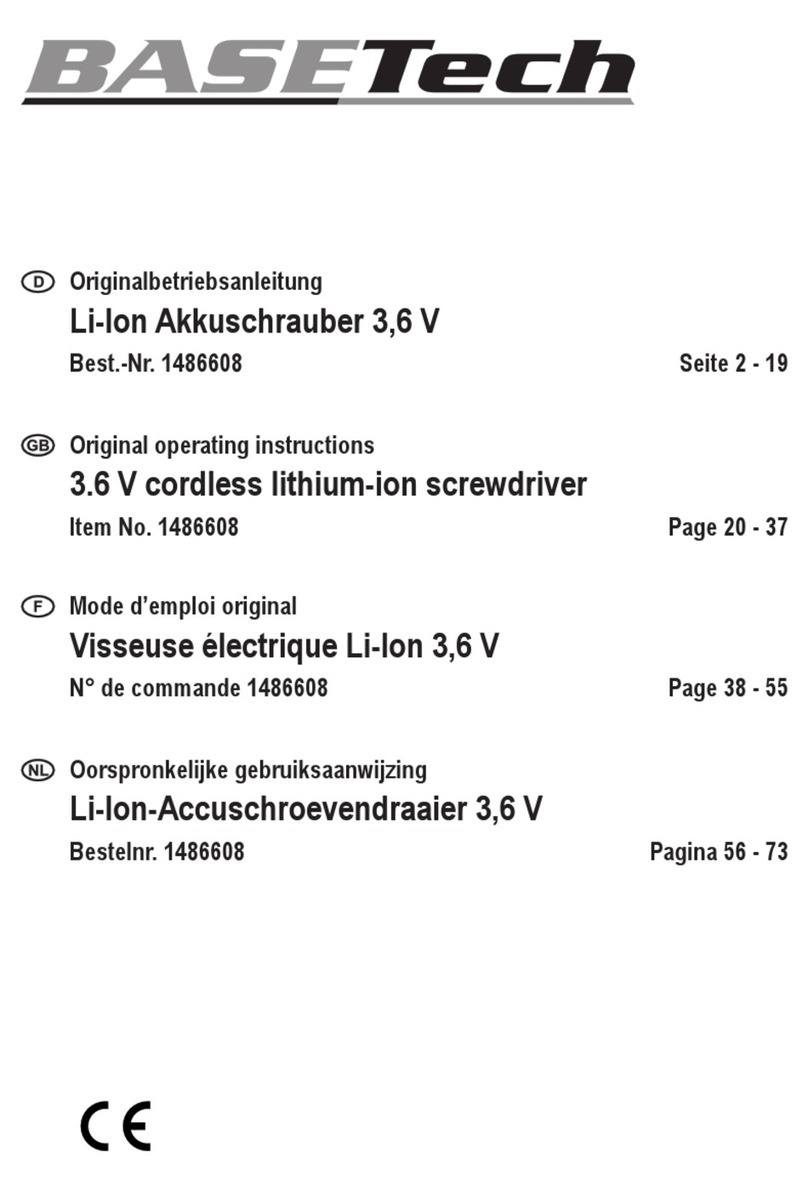
BASETech
BASETech 1486608 Original operating instructions
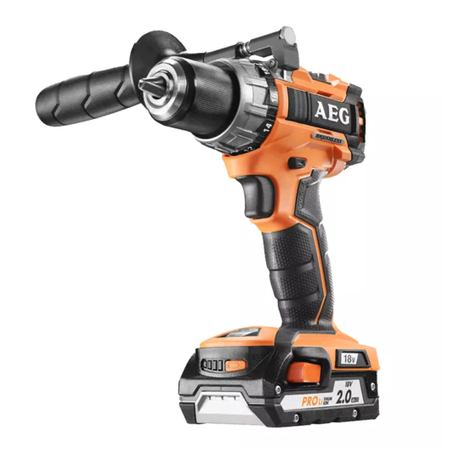
AEG
AEG BS18C2BL Original instructions
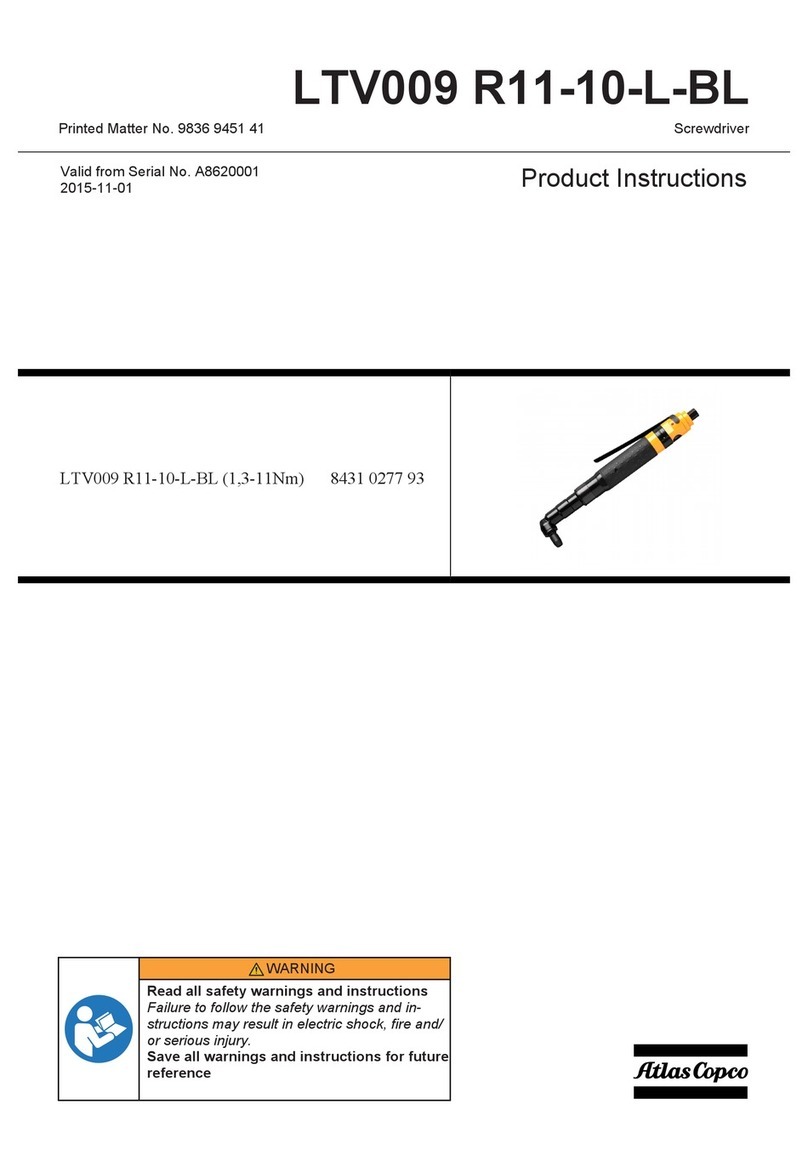
Atlas Copco
Atlas Copco LTV009 R11-10-L-BL Product instructions

Porter-Cable
Porter-Cable 6640 instruction manual
